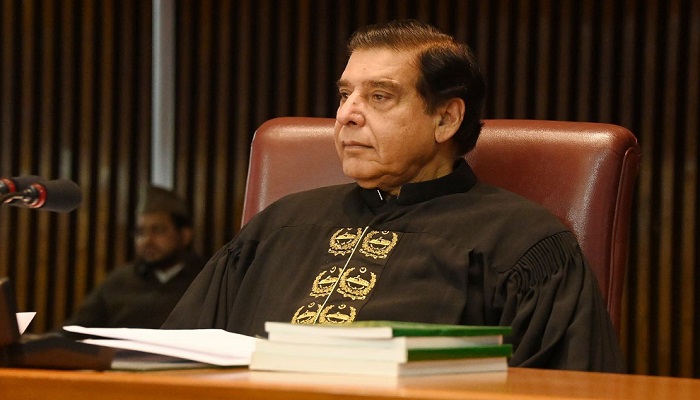NA wraps up session sans vote on finance bill as govt struggles to please IMF
During Friday's NA session, after discussions on finance bill, session adjourned to meet again on Monday at 5pm
The National Assembly (NA) wrapped up its session on Friday without a vote on the Finance (Supplementary) Bill, 2023, commonly referred to as the "mini-budget", which brings about an increase in the general sales tax (GST) from 17% to 18%, besides increasing the Federal Excise Duty (FED) on sugary items, tobacco, airline tickets, marriage halls and cement.
In a rush to meet the International Monetary Fund's (IMF's) conditions placed on its $1.1 billion loan tranche, the finance bill was laid in the House earlier this week on February 15 so Rs170 billion in revenue could be generated.
The NA session, which discussed the crucial finance bill, was chaired by Speaker Raja Pervaiz Ashraf.
Pakistan is in dire need of funds as it battles a wrenching economic crisis with the State Bank of Pakistan (SBP)-held foreign exchange reserves barely covering three weeks worth of imports.
During Friday's NA session, after discussions on the finance bill, the NA session was adjourned to meet again on Monday, February 20 at 5pm.
'Decrease burden on poor'
Pakistan Peoples Party's (PPP) Qadir Khan Mandokhail asked the government to decrease the burden on the poor and raise taxes on luxury cars and houses instead.
He said that similar to in the past when mobile [signals] were powered off to control law and order situations, it is easy to slap on more taxes on petrol, diesel and gas to address a budget deficit.
He requested the finance minister to take note of whether people owning more than one luxury homes in the posh areas of Karachi, Lahore and Islamabad were taxed.
"If you see the cars in these same homes, [you will find] they are [often] worth over Rs80 million," he said, questioning whether these cars being taxed appropriately.
Meanwhile, Muttahida Qaumi Movement-Pakistan (MQM-P) leader Salahuddin criticised the finance minister for being non-serious while presenting the mini-budget. "The level of seriousness was that he [Dar] left soon after presenting the bill," he said.
"We are here with the government just because we don't want the country to default," he said, adding that they were here with the previous government as well to push the country out of the economic crisis.
‘Death warrant’
Meanwhile, during a debate on the budget proposals in the Senate today, Law Minister Azam Nazeer Tarar slammed the PTI-led government, saying that no one is happy with the inflation but whatever happened in the last four years should be put forward.
"Who signed an agreement with the IMF on petroleum levy and the power tariff?" he questioned while pointing towards the Opposition benches.
"This is the money bill that you [the PTI] had written during your tenure," he stated.
He said that the government has imposed a tax on luxury items so that the common man is not affected.
Jamaat-e-Islami (JI) Senator Mushtaq Ahmed called the mini-budget a "death warrant", saying that the mini-budget was not prepared in Pakistan but in IMF's office.
What does the finance bill propose?
- Increase in GST on luxury items from 17% to 25%
- FED on business and first-class air tickets be increased to Rs20,000 or 50% — whichever is higher
- 10% withholding adjustable advance income tax to be imposed on marriage halls
- Increase in FED on cigarettes, soft and sugary drinks
- FED on cement to be raised from Rs1.5 kg to Rs2 kg
- Increase in GST from standard 17% to 18%
- GST to not be imposed on essential goods — wheat, rice, milk, pulses, vegetables, fruits, fish, eggs, meat
- Benazir Income Support Programme stipend to be increased; govt to allocate Rs400 billion for programme
The revenue measures, announced in the finance bill, were incorporated to woo the Fund and strike a staff-level agreement with the lender.
The Pakistan government and the IMF could not reach a deal last week and a visiting IMF delegation departed Islamabad after 10 days of talks, but said negotiations would continue.
An agreement on the ninth review of the programme would release over $1.1 billion of the total $2.5 billion pending amount as part of the current package agreed in 2019 which ends on June 30. The two sides are holding virtual talks in order to iron out differences over the fiscal measures.
-
Bitcoin plummets toward $60,000 as investors dump risky bets
-
Bitcoin crashes below $63K as regulatory pressure and market fears grow
-
Bitwise Crypto Industry innovators ETF: What investors should do in 2026?
-
Nintendo shares slide again as momentum fears grow
-
Gold, silver prices fallen sharply; What’s driving the drop?
-
Gold’s record climb: Experts question if its safety is ‘overstated’
-
Dubai unveils plans to construct street built with real gold
-
Netflix slams Paramount’s bid: 'Doesn't pass sniff test’ as Warner battle escalates












